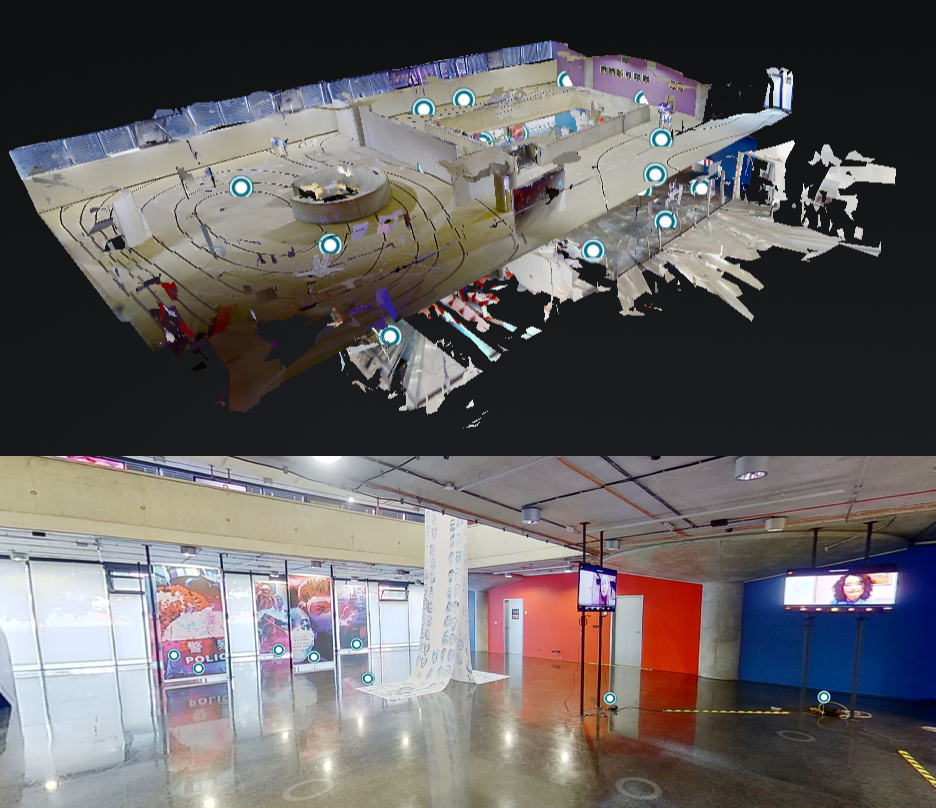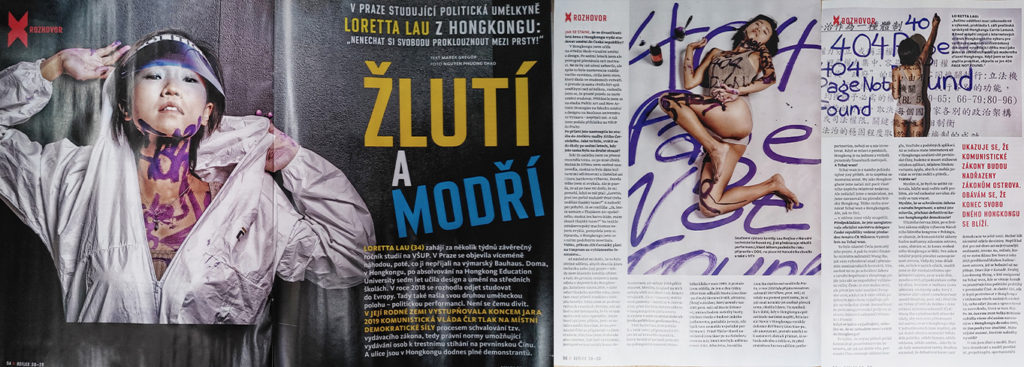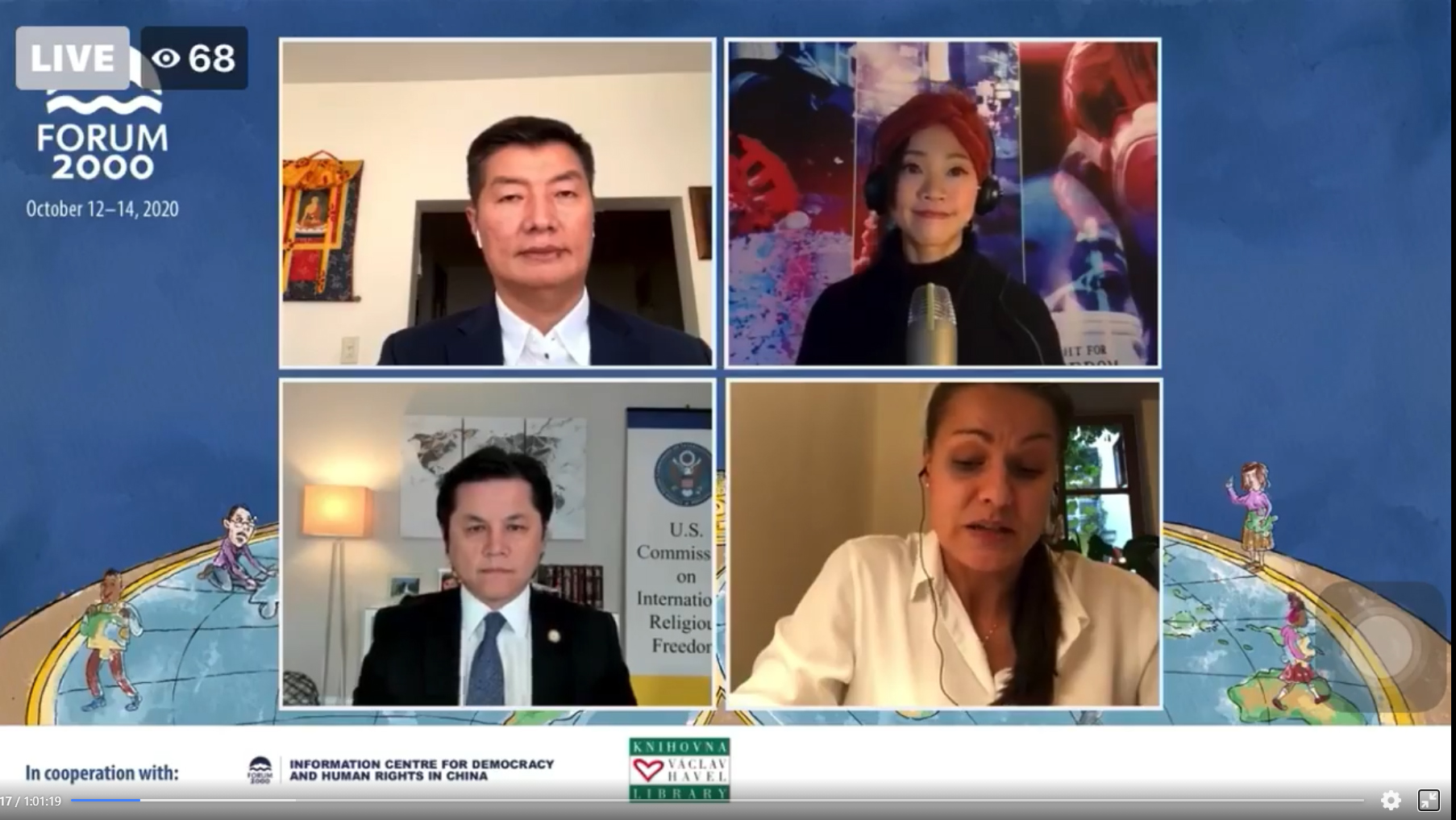(EN) Loretta Lau: This is the best time ever for us to create influence from down to top.

Loretta Lau, performative artist, was the guest of our #Forum2000online Chat. We talked about performative art as a way for people to rethink and empathise with those who are suffering injustice because of authoritarian regimes. She talked about her motivation, inspiration and her main aim to bring people to see themselves through her in new context.
In her first performance on 4th June 2019 entitled “Letter to my people” in DOX – Centre For Contemporary Art, she was shaved as a symbol of an impending prison sentence. Four months later, on 10th October, she presented a public art performance – ‘Memory Eraser’ in the National Theater in Prague, she was in the custody of a 2 meters white cube for 24 hours. Under the shadow of the pandemic, she started an online performance in March 2020, interviewed and portrayed over 160 people about their perspective on the COVID-19 situation. At the end of the interview Loretta is offering the audience her brand new piece of performative art thus we strongly recommend to watch it until the end.
„I got some online comments from the pro-China supporters, they said that my performance was too radical, which refers to a guided imagery public performance in Wenceslas Square. Why do they think that I am radical to tell the story about the massacre, but at the same moment they can neglect the brutal behavior from the regime. And I am just a mirror of social injustice.“
The interview was recorded on February 2, 2021 and moderated by Arzu Geybulla, Columnist and Writer from Azerbaijan.
西藏、新彊、香港之間的人權對話
日前香港抗爭藝術家劉慧婷應「公元2000論壇基金會」(Forum 2000 Foundation)邀請參與主題爲「新世界嶄現?恢復責任與團結」的第二十四屆論壇,並與藏人行政中央司政洛桑森格(Lobsang Sangay)及美國國際宗教自由委員會努里·特克爾(Nury Turkel)為瓦茨拉夫·哈維爾人權研討會以「中國:一個人權的難題」為研討題目,探討西藏、新彊及香港人權現況,就中國無視國際義務,進行有系統種族裔及文化滅絕、現代化集中營,以及全面的高科技監視,西方社會又應如何應對。
藝術家劉慧婷在其演說中提到香港正在經歷了一場巨大的人權危機,並陷入一場有組織的種族滅絕計劃,自去年以來中國迅速踐踏基本法及一國兩制,有意破壞香港的法治,在引渡法全盤失敗之後將國安法強加於香港的法律基礎上,可見中國和香港政府如何藐視普世的人權價值。她並提到香港無數可疑的死亡個案、警暴問題以及最近有關小學教師被教育局取消資格;12名香港青年被送中逾50日;86多名市民涉嫌違反國安法並於十一被捕等;而香港政府卻向94名警察嘉獎等無稽的社會現況嚴重侵犯人權和言論自由。
她一再呼籲中國的人權問題不僅是國內問題而是世界事務,香港走向最近的局勢始於一個不可靠的承諾,這個強大而不可信的政權正在影響世界,如果我們仍然忽略這次機會拯救香港、西藏和東突厥斯坦,及繼續關注台灣和內蒙古的情況,到世人後悔自身的自由被剝奪時卻為時已晚。
另外論壇演講者還包括臺灣總統蔡英文、捷克議長維特齊(Miloš Vystrčil)、歐盟執委會副主席喬洛瓦(Věra Jourová)、歐盟人權特別代表季爾莫(Eamon Gilmore)以及英國牛津大學教授艾許(Timothy Garton Ash)等。公元兩千論壇是捷克前總統哈維爾(Václav Havel)在1996年創辦的國際會議,旨在推廣民主、保障人權和強化公民社會,每年10月於布拉格舉行,今年卻受疫情影響而改爲網上召開,並於12日揭開序幕,是捷克政壇重要的年度會議。
而蔡英文在開幕致詞中表示,「有些政權」趁他國抗疫之際,操縱科技監控人民、把持物資、限制資訊及言論自由,擴張主義侵蝕以規範爲基礎的國際秩序,屢屢引發邊界領域的衝突,以及罔顧自由人權,最令人遺憾的是目前的香港情勢發展,又捷克維特齊議長演說則聚焦於民粹主義興起,爲當今世界帶來嚴重問題,並終將侵蝕民主。
有關資料: 瓦茨拉夫·哈維爾人權研討會「中國:一個人權的難題」 https://www.facebook.com/CTATIBETTV/videos/341762530376308
蔡英文出席公元兩千論壇 與捷克參議長共促民主國家合作 https://news.ltn.com.tw/news/politics/breakingnews/3319273?fbclid=IwAR1S0_Vw49oH70lXf5RQIbQ6cIkCWobH8V8EDZCdbN59PlBlvo87x7YY1ak
Online Gallery : Confession

If you couldn’t visit the show in galerie NTK, click the link and start your 3D gallery experience.
不要讓自由從指縫間溜走

REFLEX.CZ訪談
文字:Marek Gregor
照片:Nguyen Phuong Thao
LORETTA LAU(34)於布拉格藝術、建築與設計學院(UMPRUM)快將展開最後一年視覺藝術碩士課程,本來投考了德國魏瑪包豪斯大學(Bauhaus-Universität Weimar)的她,來到布拉格學習或多或少是一個偶然。 她在香港教育大學畢業後於兩所中學教授視覺藝術科達七年之久,2018年她毅然決定去歐洲留學,在這裡她找到了一個新的藝術定位——政治行為藝術家。這都無可厚非,2019年6月中共政府草擬的引渡法當頭棒喝香港長久以來的法治基礎,該項法案旨在引渡被刑事起訴的港人到中國服刑,直到現在民主抗爭已成為港人的日常。
是甚麼令一位32歲的香港女性來到捷克學習藝術?
畢業之後我在香港兩間中學從事視覺藝術科教師,七年過去我卻漸漸失去教學動力,這並不是因為我對教育的熱情冷卻,而是香港教育制度對學生所施加的壓力使我感到極度沮喪。就個人而言成為藝術家比視藝老師更接近我對自己的期盼,所以我決定出國學習,初時報考了德國Bauhaus的公共藝術與新藝術策略課程,得知未獲取錄後我迅即投考布拉格的UMPRUM。
您七年後重返校園在Jiří Černický的繪畫工作室開始學習,由教師再次成為學生的感覺如何?
一開始我感到非常錯愕,我完全無法理解他到底想我做什麼,總覺得Jiří不太喜歡我,或者是我們之間的文化差異及語言障礙所致。起初實在是難以適應,過了一段時間他竟然問我:「Loretta你為什麼總是畫畫?你不如試下跳泰國舞?」 然後他做了一些雙手合十等跳舞動作,我看得無名火起:「泰國舞跟我有何關係,難道膚色黝黑的我就該懂得跳泰國舞嗎?」 實在看不慣這種中歐大男人主義,在香港我從來都沒有遇過這種對待。
我還以為Jiří Černicky 是UMPRUM中最著名的女權主義者…
隨後我意識到他想遊說我使用其他技巧或不同的表達方式去創作,而不應局限自己於炭筆或油畫等傳統媒介之中。第一學期的鬱悶促使我急不及待地飛回香港與朋友和家人度過2019年的農曆新年,兩個星期後我帶著活力重返歐洲,當時我完全無法想像一場惡耗將降香港。我開始在互聯網上看到中國正在制定引渡法,人們開始害怕香港法治受損,第一場小型的示威爆發,參加遊行的人數不超過一萬。直到6月9日,即香港立法會對法例進行二讀之前,才發生了重大的轉折點,逾百萬港人上街表示不滿。
與此同時您展開了政治行為藝術表演…
2019年6月3日,六四大屠殺發生三十週年之時,DOX當代藝術中心舉行了一次紀念晚會,是次晚會紀念1989年在北京天安門廣場被殘酷鎮壓的死難者。我僅在晚會兩週前得知捷克著名雕塑家Marie Šeborová剛完成了劉曉波的半身像,並將其聳立於該藝術中心的展覽廳。她也是愛爾蘭國會大廈內瓦茨拉夫·哈維爾(Václav Havel)半身像的作者,而哈維爾便是2010年劉曉波獲得諾貝爾和平獎之提名人。其實香港亦曾經出現過兩次劉曉波雕塑,但作者都害怕承認其身份,故以匿名贈出。而那時香港的緊張局勢再次升溫,於是我鼓起勇氣告訴自己要走到劉曉波半身像前進行第一次行為藝術,並電郵DOX可否在該藝術中心演出。
劉曉波的妻子劉霞剃光頭以象徵丈夫多年來所受的牢獄之苦,而我為了紀念劉曉波及其他為自由民主犧牲的每一位,我決定作剃頭的儀式,並由另一位香港藝術家黃諾翹所執行。對於我來說,那次表演最不可思議的地方是在完結後很多人主動聯絡我,關心香港的情況。
您是什麼時候開始意識到香港或中國所謂的「一國兩制」存在問題?
2013年中國開始明目張膽地擾亂香港的教育制度,香港的教育一直以德育及公民教育為基礎,我們從小就了解「普世價值」、「三權分立」及「公民社會」的重要性,教育局突然想改寫課程及加強學生的愛國意識,許多年輕的抗爭者、學生和教授都對此表示反對,而戴耀廷教授是「讓愛與和平佔領中環」運動的領導人之一,然而他今年已被香港大學開除了多年來的教席。我們當時已意識到他們想進行洗腦教育,並將我們變成言聽計從的中國公民。但在過去一百五十年香港一直是西方文化的一部分,這是街頭抗爭的因由,首先是反國教,然後是雨傘革命,從2014年8月到12月街上有成千上萬的人群,高峰時每天更有120萬人。
那是什麼結束了2014年雨傘革命?
他們設法通過許多虛假的承諾使大家平靜,無謂的反抗只會拖延普選步伐 。香港人是水中的青蛙,我們沒有意識到鍋中的水越來越熱,在那沸騰的水中感到格外舒暢,最後卻被活活煮死。
當初人們如何看待香港在1997年七月一日從英國移交中國以及五十年不變的諾言?
那時我只有十三歲,但是我記得當晚即使滂沱大雨,英方的告別儀式依然盛大。人們不知道將來會發生什麼事,許多人因對香港的前途感到擔憂而飛往加拿大或英國。然而當時的行政長官董建華並沒有採取任何明顯的行動去遏制民主,公民自由看似得到保障。人們出入境頻繁,同時香港繁榮依舊,許多人離開了又回來,至少在最初十年許多人對從英國過渡到中國管治下的香港持正面的態度。
這聽起來十分奇怪,畢竟六四大屠殺與主權移交之間只相差八年…
你要知道金錢對香港人的重要性,而且香港一直以來都是國際金融中心,在金錢的誘惑下人們容易忘記傷痕。
葡萄牙前殖民地澳門也是中國管理下另一個一國兩制的特區,與香港只隔五十公里的澳門為什麼沒有像香港這樣的大型示威發生?與澳門是賭博天堂有關嗎?
我想這與人們的心態有關,這實在很難說,我不想作出沒被實証的判斷,但比較一下香港和澳門的公立大學數量及質素,我認為這可能與公民教育有關。此外香港作為世界金融中心,我們擁有可靠的金融體系,以及其他國家對香港的信任,這使香港人產生強大的自我認同感。
那台灣呢?
從我的角度來看,台灣是一個完全不同的故事,它是一個成功的民主國家。香港人的本土意識雖強,但我對香港能否成為一個獨立國家依然抱有懷疑,大部分人還沒有要求獨立,而只想繼續原本的香港,我很難把兩地作比較,但是我們卻有著共同的目標。
您應該知道捷克參議院主席韋德齊(Miloš Vystrčil)最近到台灣訪問…
我十分驚訝,其後看了韋德齊的演講及中國外交部長王毅的口頭威脅。王毅揚言要切斷兩國的外交關係,在我看來這像是宣戰的腔調。縱使捷克是一個小國,但畢竟也是歐盟的一部分,中國的論調實在滑稽,當然德國和法國外交部長對捷克的支持在是次事件中亦持重要的角色。
這樣說您不怕自己無法返回香港嗎?
大概吧…我現在主要通過互聯網與朋友和家人溝通,但中國在大陸限制使用Google、YouTube、Facebook之類的網頁,一旦香港的互聯網成為大陸網絡的一部分,我怕之後要下載有間諜成份的中國應用程式才能與父母和朋友溝通…
你會返回香港嗎?
如果我家中發生甚麼事,我還是會冒險回去的,但是現在我沒有甚麼理由要回去。
您認為《國家安全法》是否香港民主法制的終結?
在2020年6月30日《國家安全法》通過之後,中共法律凌駕於香港基本法之上,我的確擔心香港自由即將終結,該法案完全否定了香港的自治權。我們竭盡所能試圖讓國際社會了解香港每日所發生的事情,事件亦廣受國際社會所關注,例如前學生領袖羅冠聰為了安全起見,於2020年7月2日離開香港,而三週前他在中國外交部長王毅抵達柏林時,向德國政府展示香港社會的近況。許多香港人在默默耕耘,有人從事政治游說工作,有人善長文宣,有人在做藝術……許多人出國其實是希望在海外進行另一種抗爭,例如導演歐文傑搬到加拿大居住,他在2015年的電影《十年》中預言香港十年後的境況,但不幸的是這些情況已在現實社會中發生;其次是漫畫家柳廣成,他移居到台灣後致力於政治漫畫創作,以鮮明畫風譴責中國和香港政府的不仁。我實在難評論在香港抗爭,還是在其他地方引起海外社會關注才是更好的選擇,但我相信這並不是自由民主的終結。
2020年6月30日之後,英國向所有在1997年之前在香港出生的公民提供庇護,您認識任何人尋求這協助嗎?
現今香港主流分為黃藍兩派,黃絲支持自由民主,藍絲則支持港共政權,後者是既得利益者,為利益而討好政權,只要有錢他們就看不見殘酷的鎮壓。我認識一位女生,她聲稱由於傳統家庭價值觀以及對繁榮的看法,使其想法與中國政權較為接近,可是現在她卻成為首批飛往英國避難的一群。我很欣賞許多黃絲的態度,他們以僅餘的力量和盼望留在香港,更有很多青年人為自由和民主而犧牲自己的未來,他們真正熱愛自己的土地。
2016年中國國家主席習近平在總統米洛什·齊曼(Miloš Zeman)的邀請下訪問了捷克,成百上千的人們慶祝他的探訪,我認識一些反對者受卻到人身攻擊, 那您在捷克有遇到一些中國人嗎?
有趣的是自從我來到布拉格都沒有遇見中國人,最多遇到中國遊客,可能是因為我現在生活在布拉格的藝術圈之間。可是最近我收到一些社交網絡的攻擊,今年六四我在瓦茨拉夫廣場(Wenceslas Square)上演出,並以說故事的方式去紀念天安門大屠殺的死難者,然後我開始收到一些不懷好意的批評,他們說我是法輪功學員,而法輪功在中國是被惡意描述為邪教的組織,我曾收到類似「你靠哪邊?三八!」的訊息,但我並不在乎網上恐嚇。
您在捷克感受到人們的支持嗎?
我在這裡得到很多人的支持,例如國家科技圖書館畫廊的展覽策展人Milan Mikulaštik。今天捷克人民過著穩定的生活,我嘗試把在世界另一端的香港所發生的事情一一告訴他們,我希望創作能夠把人們連結起來。三十多年前在捷克所發生的「布拉格之春」和「天鵝絨革命」與香港現狀有共通之處,這亦解釋了為什麼在今次的表演中,我把哈維爾1990年的新年演講,與現任中國國家主席習近平今年的新年演講進行對比。倘若您生而享有自由,請記住曾經有人為您的自由淌血,不要以為自由是理所當然的。
Don’t let freedom slip through your fingers
INTERVIEW – REFLEX.CZ

Text: Marek Gregor
Photo: Nguyen Phuong Thao
LORETTA LAU (34) will be starting her final year of studies at the Academy of Arts, Architecture and Design in a few weeks. She came to Prague more or less by accident after she was not accepted to the Weimar Bauhaus. At home in Hong Kong, she taught design and art in high school for seven years after graduating from the Hong Kong Education University. In 2018 she decided to go to study in Europe, where she also found her second artistic position – political performance artist. No wonder why, AT THE END OF SPRING 2019 IN HER COUNTRY, THE COMMUNIST GOVERNMENT OF THE PRC PERFORMED PRESSURE ON LOCAL DEMOCRATIC FORCES through the process of approving the so-called extradition law, a legal norm enabling the extradition of persons to criminal prosecution for mainland China, and the streets of Hong Kong are still full of protesters.
HOW DOES A 32-year-old woman from Hong Kong go to study art in the Czech Republic? In Hong Kong, I taught visual arts and design in high school. However, after seven years I gradually stopped having motivation. It is not the teaching that bored me, but the Hong Kong education system imposed huge pressure on my students, which frustrated me. I always dedicated myself to becoming an artist rather than an art teacher, so I decided to study overseas. My application was not accepted under the Public Art and New Architectural Strategies at the Faculty of Art and Design at Bauhaus University in Weimar, so I promptly applied to the Academy of Arts, Architecture and Design in Prague.
You started your study at the painting studio of Jiří Černický. How did you feel to return to school after seven years and to begin in an opposite position?
It was shocking to me in the beginning. I was not able to understand what exactly they wanted from me. Maybe Jiří did not like me so much, maybe it was because of cultural differences, or maybe the language barrier. It was hard to get adapted. After a while, he kind of helped me when he asked “Loretta, Why do you always paint? Why don’t you try some Thai dancing?” He made a few dancing movements and provoked me. I thought “I have nothing in common with Thai people, shall I try Thai dance merely because of my skin colour?” I was not used to this Central European machismo. Of course, I never had to deal with it in Hong Kong.
I see, but Jiří Černicky is known as a renowned feminist in UMPRUM…
Subsequently, I realized that he was explaining to me to try another technique or different expression when I was painting classically with charcoal and ink. After the first semester, I went to Hong Kong in depression. At the beginning of February 2019, at the time of the lunar new year celebrations, I was charging my energy with my friends and family. When I returned to Europe after two weeks, I could not imagine that something bad might happen there. But as soon as I arrived, I started to see in the media that mainland China is preparing the extradition law. I was watching it all through the internet, people were scared, and a small demonstration erupted, but they weren’t too massive yet. I don’t think the participation in them was more than ten thousand demonstrators. The turning point – over hundreds of thousands of protesters – did not occur until June 9, 2019, before the second reading of the law in the Hong Kong Parliament.
And at the same time, you discovered yourself a political performance artist…
On June 3, 2019, in DOX Center for Contemporary Art, there was an evening memorial commemorating thirty years since the bloody massacre that brutally suppressed protesters in Beijing’s Tiananmen Square in 1989. And because I knew that only two weeks earlier they put a bust of Liu Xiaobo (a Chinese literary critic, activist, philosopher, and dissident who died in 2017; editor’s note) by Marie Šeborová, who is also the author of the bust of Václav Havel in the Irish Parliament building. I asked them if I could hold a performance there. It was Václav Havel who nominated Liu Xiaobo for the Nobel Peace Prize, which was awarded to him in 2010. His wife, poet Liu Xia ( she visited Prague multiple times, in 2018 she was received by Czech minister of foreign affairs Petříček; editor’s note) then shaved her head to protest that her husband could not go to the award in person. It was a huge symbol because in that time tensions were rising in Hong Kong again! Additionally, two busts of Liu Xiaobo were created in Hong Kong anonymously, the artists were afraid to admit to authorship. I mustered the courage and told myself that I would perform in front of that bust, my first one! In his honor I got my hair shaved by an executor (represented by another Hong Kong student at the Academy of Arts, Architecture and Design in Prague, Ingrid Wong; editor’s note) Do you know what was incredible from my point of view? After the performance, a lot of people came to me and wanted to talk about the situation in Hong Kong.
When did you first realize that there was something wrong with Hong Kong, or with China’s proclaimed principle of ‘one country, two systems’?
In 2013, when the PRC began to influence the state education system in Hong Kong. Education here has always been built on civic foundations, we have learned about civil society elsewhere in the world, about the separation of power in the state, and they suddenly began to rewrite the curriculum, with the proviso that we have to become patriotic. Many young activists, mostly students and their professors spoke out against this. Professor Benny Tai, one of the leaders of the Occupy Central with Love and Peace movement, was fired this year from the university where he lectured for many years. We realized that they wanted to brainwash us and turn us into obedient citizens of China. At the same time, Hong Kong has been a part of Western culture for the last one hundred and fifty years. That is why the first major street protests took place, first students and teachers, then more, an umbrella movement was established. From August to December 2014 there were hundreds of thousands of people on the streets,1.2 million in a day at the peak.
Why did the 2014 protests end?
They manage to calm us with a lot of promises. They promised us and said ‘Don’t worry, we’ll approve everything, but now is not the time.’ We Hong Kongers are frogs in the water who do not notice that the water in the thermal springs is heating up more and more. The frog won’t get it when he’s cooked alive, and we felt quite comfortable in that boiling water.
How people perceived the handover of Hong Kong under Chinese rule from the UK on July 1, 1997 (after 100 years of rule over so-called New Territories, rented from China; ed. note), with a commitment to an agreement that CPR will grant autonomy for Hong Kong for 50 years?
I was young, I was thirteen, but I remember that even though it was raining, people took to the streets, they didn’t know what was going to happen. Many people flew to Canada or Britain, leaving the island with apprehension. At that time, the chief executive Tung Chee-hwa did not take any visible steps to curtail democracy — the free movement of people, civil liberties, was guaranteed, and at the same time there was a sense of clear prosperity — so many of them who left were returned. For at least the first ten years, the transition from British to Chinese administration was perceived positively by many people.
You see, this sounds strange to me – after all, it was handed over to Chinese administration only eight years after the aforementioned massacre in Tiananmen Square.
You know, people in Hong Kong think more about money than anything else. It is probably given historically – it has always been primarily a financial center. And in the name of money, they simply forget. It is reminiscent of amnesia, somewhere historically encoded.
Just a short distance from Hong Kong lies the former Portuguese colony of Macao – another territory administered by the PRC since the end of the century, according to one country, two systems. It is only fifty kilometers between the two islands. Why are there no more visible civil protests like in Hong Kong? Is it because Macao is a gambling paradise?
It’s about the mentality, it’s hard to say, I don’t like to express uncompromising judgments, but I think the basis is access to education. Just compare the number of universities in Hong Kong and there. Besides, Hong Kong is the world’s financial center, we have a historically reliable system, people from other countries trust us as partners, they are not afraid to invest with us. When it comes to money, Hong Kong is at the top of the pyramid of financial metropolises.
What about Taiwan?
From our perspective, Taiwan is a completely different story. It is a successful independent country. We as Hong Kongers started to have a sense of local consciousness not so long ago. But we did not ask for independence, we just wanted to continue original British Hong Kong. I can hardly compare Taiwan to Hong Kong, but, how to say it, we have always been comparable in some ways.
I guess you knew about the recent visit of the chairman of the Czech senate Miloš Vystrčil to Taiwan.
It was incredible! I read his entire speech and then the reaction of the Chinese Foreign Minister Wang Yi, as he threatened to cancel diplomatic relations. You know, personally, after the National Security Law, it almost seems like a declaration of war to me. Even if Czechia is a small country, it is part of the European Union. When someone says something like that, it seems very strange to me. Of course, I also noticed support from the foreign ministers of Germany and France.
Speaking like this, aren’t you afraid you won’t be able to return to Hong Kong?
I guess so. I still communicate with my friends and family over the Internet, but as you probably know, mainland China restricts the use of Google, YouTube, and similar applications. Once the Internet network in Hong Kong becomes part of mainland China’s network, we will have to download Chinese version applications, to chat with my parents and friends.
Will you be back?
I think I would risk it if my parents had a problem, but I certainly don’t see a reason to go back now.
Do you think that passing the National Security Law brings a definite end of Hong Kong democracy?
On June 30, 2020, after passing the National Security Law, we can see that communist laws will surpass the Hong Kong basic laws and yes, I do fear the end of freedom in Hong Kong is near. That law completely denies the self-government of Hong Kong. We have always done everything in our power, we have tried to let the international community know what is happening in our country, and many of those cases have received worldwide acclaim. For example Nathan Law (an activist, student leader who left Hong Kong on July 2, 2020, for his safety; ed. Note) He arrived in Berlin three weeks ago during a meeting between Foreign Minister (PRC) Wang Yi and representatives of the German government, to show what was happening in Hong Kong. Individually we are successful, but how to give strength to others? Someone is working on politics, someone is advertising, someone is doing art…. It seems like separate entities, however, I hope this is not the definitive end of our democracy, even though many people went abroad, we are protesting in another dimension. For example two of the most prominent figures for me today – Director Jevons Au who, in his 2015 film Ten Years, predicted the near future of Hong Kong, which is unfortunately already being fulfilled, moved to Canada. Second, Lau Kwong Shing emigrated to Taiwan in the summer to devote himself to comics that denounced political practices of mainland China and the Hong Kong government. It is hard to say whether it is better to protest in Hong Kong, knowing all the possible consequences, or to go elsewhere and draw attention from the overseas community.
After 30 June 2020, the United Kingdom offered asylum to all citizens born in Hong Kong until 1997. Do you have any acquaintances who took advantage of this offer?
In Hong Kong, there are yellow and blue groups of people. Yellow are democrats and blue are Beijing supporters and opportunistic populists, who do not mind marrying the regime in the name of benefit. When there is money, they do not perceive brutality. For example, I know a lady who claims that due to her family values, Chinese tradition, and her idea of prosperity that she has to take care of her closest ones, for those reasons her ideas are much closer to mainland China. But now in July, she was in the first seat on the plane to the UK. On the contrary, I admire the attitude of many yellow ones, who still have the strength, ability, and needs to stay in Hong Kong and sacrifice themselves for freedom and democracy. They love their country.
In 2016, Chinese president Xi Jinping visited Czechia invited by president Miloš Zeman, hundreds even thousands of people celebrated his arrival. I know a few people, who were in protest against him being exposed to physical attacks. Do you meet blue people in Czechia?
It is interesting since I was here I did not meet many people from mainland China, but mostly tourists. It’s probably because I live among artists. However, what I see regularly is hatred on social networks. This June I was performing on Wenceslas Square to commemorate the Tiananmen Square massacre, then I started to receive hateful comments. They said I looked like practicing Falun Gong (spiritual movement, sometimes described as a cultivation method of Buddhist school), which is depicted in mainland china as an infectious new age movement. I got messages like “Which side are you on? Witch!” but I don’t care about online threats.
Do you feel support from Czech People?
I feel a lot of support here. For example Milan Mikulaštik, curator of my exhibition in the Gallery of National Technical Library. I also put my actions in a local context, like the Prague Spring and Velvet Revolution. People in the Czech Republic have a stabilized life today, I try to bring them closer to what we are experiencing on the other side of the globe, and that it is very similar to what you experienced here thirty or more years ago. That is why in my current exhibition I contrast Václav Havel’s speech from 1990 with the speech of the current president of China, Xi Jinping from 2020. If you were born with freedom, remember some people fought for you, so please take care of it and not let it slip through your fingers.
Confession Of Virus Isolation Days19 (COVID-19) – Trailer 2
A Project of our time, of our people, and of our nature.
Confession Of Virus Isolation Days19 (COVID-19) is an online performance art project, inspired by the quarantine situation all over the world. A massive live-streaming discourse among guests and artist Loretta Lau accomplished in 19 days of isolation from 25th March to 12th April. 166 international artists, musicians, actors and individuals were invited to participate in a confession session, to share their unique emotion and story in this hard isolation time.
For enquiry and press, please contact us by email: info@waitinglorettalau.com


